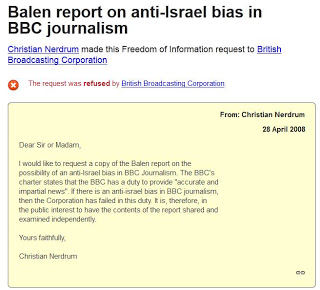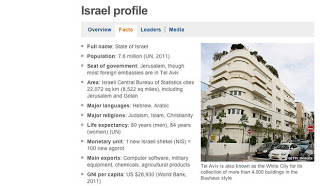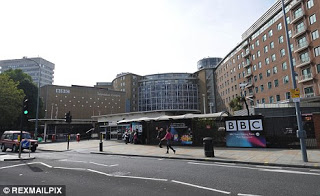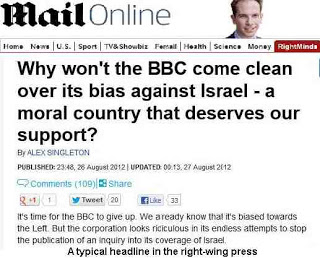 |
| BBC went all the way to the Supreme Court to suppress the Balen Report. Lying tabloids like the Daily Mail fooled their readers that it was in order to hide its pro-Palestinian bias! |
How the BBC Denies the Reality of Israel’s Occupation of Jerusalem
As Sharif Nashashibi wrote, if you make an allegation of BBC Bias Against Israel long enough it sticks. It is one of the myths of right-wing journalism that the Beeb is biased against Israel. However there is no evidence for this absurd allegation, quite the contrary. What Israel’s supporters really mean is that on occasion, rare though it might be, the BBC allows a pro-Palestinian story to slip through.
A good example of this is the former supporter of the British Union of Fascists, our very own splenetic Daily Mail. The fascists’ friend is also a strong supporter of Israel, e.g.
Alex Singleton absurd Why won’t the BBC come clean over its bias against Israel – a moral country that deserves our support? is a typical example of how an article begins with a conclusion and works backward.
But the coverage of the massacre on the Mavi Marmara and the Panorama’s subsequent ‘exclusive’ – narrated by a the journalistic whore Jane Corbyn, which quoted uncritically from the murderers to whom she was given unqiue access (unlike Commissions of Inquiry) and the refusal even to air the ad for the Disaster Emergency Committee appeal http://www.guardian.co.uk/world/2009/jan/22/gaza-charity-appeal after Israel’s Nazi-style bombing of Gaza, demonstrates the real bias.
Below is an excellent article by Electronic Intifada’s Amena Saleem on how the BBC even dies the reality of the Occupation in Gaza.
Tony Greenstein
How the BBC denies Israel’s occupation
Amena Saleem
The Electronic Intifada
Glasgow, 28 September 2012
There is international law, and there is the world as Israel and the BBC see it. And if Israel claims the whole of Jerusalem as its territory, contrary to international law, then it is not for the BBC to dispute this — or so its coverage would have us believe.
In its country profile for Israel, the BBC’s website lists statistics including Israel’s size in square meters, its major languages and its main exports. Shying away from giving a capital, as it does for all other recognized countries featured in such profiles, the BBC’s online editors have opted instead to give Israel a “seat of government” (“Israel profile,” 11 September 2012).
And this seat of government, according to the BBC, is Jerusalem. All of it. This is despite the fact that international law is quite clear that East Jerusalem is Palestinian territory, illegally occupied and annexed by Israel. Israel, however, refuses to accept UN resolutions on Jerusalem and continues to claim it all, undivided, as its own. The BBC, it would appear, is backing Israel up on this.
This is how Israel’s claim to Jerusalem is presented on the BBC website: “Israel profile. Seat of government: Jerusalem, though most foreign embassies are in Tel Aviv.”
The Israeli government does not recognize Tel Aviv as Israel’s capital, and so the BBC obligingly does not give a capital for Israel in its country profile — noting, instead, in its specially-created “seat of government” category, that “most foreign embassies are in Tel Aviv.”
The website also runs a profile for “Palestinian territories” and this gives an “intended seat of government.” Under this category, BBC editors have written “Intended seat of government: East Jerusalem. Ramallah serves as administrative capital” (“Palestinian territories profile,” 31 August 2012).
Concealing the truth
There are no difficulties here for the BBC in making a distinction between East and West Jerusalem. Rather, the difficulty for the BBC lies in admitting that Israel occupies the “Palestinian territories.” Nowhere in the profile is the occupation mentioned, and the land is not referred to as the “occupied Palestinian Territories” — the wording used by the United Nations — but simply as Palestinian territories. And of course there is nothing to inform the reader of the ethnic cleansing of Palestinians from Jerusalem from 1947 onwards, and how the division of the city came about.
The UK-based Palestine Solidarity Campaign challenged the supposedly impartial BBC on its assertion that the whole of Jerusalem is Israeli territory, a falsehood which Israel is keen to propagate in its attempts to create facts on the ground.
The PSC pointed out over a series of email correspondences since July that it would be simple enough for the BBC to add the word “West” to let its audience know that Israel’s seat of government is not in Jerusalem, but in the western half of a divided city. This would also guarantee 100 percent accuracy, surely a priority for a major news organization.
Richard Hutt, complaints director at the BBC, sent a detailed email on 18 September to say: “It seems to me that the current content on the page for Israel acknowledges the Israeli view, but contextualizes it so that it is clear to readers that this is disputed.”
With no hint of irony, Hutt goes on to say, about a page that is subtitled “Facts”: “Although more information would have been helpful, I do not believe that the content would mislead readers as to the basic facts.”
Laughable
Hutt’s defense of the BBC position becomes laughable as he defies logical argument in his attempts to defend inaccuracy in the BBC’s news pages.
Explaining why the BBC refers to “Jerusalem” on the “Israel” profile and “East Jerusalem” on the “Palestinian territories” profile, he says: “I do not think that ‘due’ impartiality in this context would require that the language for one page mirror that of the other.”
Hutt then says he does not think readers would make the assumption that the whole of Jerusalem is Israeli territory from the BBC’s reference to the whole of Jerusalem being Israel’s seat of government.
He argues: “The only grounds I can see for reaching such a conclusion are that the content for the [Palestinian territories] page lists ‘East Jerusalem,’ whereas the reference to Jerusalem on the Israel page is not similarly qualified.”
That is the exact reason given by the Palestine Solidarity Campaign to the BBC in its request for the qualifier “West” to be added to “Jerusalem” on the Israel page. Bizarrely, Hutt appears to acknowledge that argument, before concluding that no alteration will be forthcoming.
Defending criminality
Israel’s claim to an undivided Jerusalem is not the only area where BBC terminology privileges Israeli occupation and colonization.
However, just as BBC reporting consistently fails to mention the fact of Israel’s occupation of Palestinian land, it is similarly coy about spelling out the criminality of its settlement building, despite UN Security Council Resolution 446’s clear definition of settlements as a “serious obstruction to achieving a comprehensive, just and lasting peace in the Middle East.”
The Palestine Solidarity Campaign has not been alone in asking the BBC why, without fail, in all its online reports concerning settlements, as well as in television and radio broadcasts, it uses this line: “The settlements are considered illegal under international law, though Israel disputes this” (“Israel anger at S Africa ‘Occupied Territories’ labels,” 22 August 2012).
The line will be found buried at the end, or near the end, of any article about settlements and provides scant context for the preceding content.
What is interesting is the need the BBC feels to use this line. Settlements are not stated categorically as being illegal under international law, simply “considered” to be, and a disclaimer is added — “Israel disputes this” — as though international law is not the last word on what is legal for nations.
Tarik Kafala, the Middle East editor of BBC Online, replied to a Palestinian living in the UK, who had emailed him to question the use of this line. Kafala’s reply, sent in October 2011 and seen by this writer, explains the BBC’s reasoning for its caution, erring on the side of Israel.
“The contention that settlements are illegal … is hugely well founded in international law, but an opinion,” Kafala writes.
And then this: “We also feel that to simply state that the settlements are illegal under international law is potentially misleading. An untutored reader might wonder why, if Israel is so flagrantly breaking the law, such a criminal state is still a member of the UN, a favored ally of the US, a major trading partner of the EU and so on.”
It’s an astounding assertion from a senior BBC editor. It also lays bare the BBC’s policy on reporting on Israel and its daily violations of UN resolutions, Geneva conventions and International Court of Justice rulings. There is a softening, a tempering of the reality, if it is even reported at all, which is rare. An intellectual analysis for the BBC audience of why a “criminal state is still a member of the UN, a favored ally of the US, a major trading partner of the EU” is out of the question.
Such an analysis would require honesty about the political situation, not just in Palestine and Israel, but in the Middle East as a whole, and Kafala’s incredible revelation shows that the BBC is not capable of such honesty.
The resultant dishonesty, and the attempt to keep the truth about Israel’s illegal actions from its audiences, is spread across the whole of BBC programming, from news right through to entertainment.
Not interested in reality
An activist with Jews for Boycotting Israeli Goods spent a year in correspondence with the BBC over “Top Gear Middle East Special,” an entertainment program for motoring enthusiasts broadcast on BBC Two in December 2010. It traced a trio well-known to UK TV audiences traveling from Baghdad to Bethlehem in a convertible sports car.
As presenters James May, Jeremy Clarkson and Richard Hammond drove through Syria, viewers were given the following information about the occupied Syrian Golan Heights: “For political reasons, this was Syria and is now Israel.”
In reality, the Golan Heights is Syrian territory, illegally occupied and annexed by Israel. UN Security Council Resolution 242 makes this clear and additionally calls for the withdrawal of Israel from the Golan Heights, the West Bank, including East Jerusalem, and Gaza.
But the BBC isn’t interested in reality when it comes to Israel. What appears to be more important for this publicly-funded UK broadcaster is to shield Israel from criticism of its illegal actions by hiding the truth of those actions from its audiences. In this instance, the BBC was prepared to broadcast an outright lie about the status of the Golan Heights.
Wiped off the map
And to hide the existence of the Palestinian West Bank — where Bethlehem is located — the program used maps which named only Israel. Palestinian land was effectively wiped off the map by the BBC. This mirrors the maps used in Israeli schoolbooks and Israeli tourism guides, which show all the land which was once historically Palestine as being “Israel.” Gaza and the West Bank are not named.
To complete the deception, at no point during the drive to Bethlehem or on arrival did the presenters use the words “West Bank” or “Occupied Palestinian Territories.”
Instead, viewers were told that the “final border crossing” before arriving in Bethlehem would be from Jordan into Israel. The crossing from Israel into the West Bank, which has to be made in order to reach Bethlehem, was ignored by the BBC, and viewers were left to think that the city is in Israel. There was no indication of the existence of Palestinian land.
It is a narrative that would thrill the Israeli government. To justify its broadcast, the BBC’s Editorial Standards Committee ruled, in December 2011, that, because Top Gear is an entertainment program, there was no requirement to “make the location of Bethlehem explicit.” Why the location of Bethlehem had to remain hidden when the location of every other city visited by the presenters was marked clearly on the maps they used constantly throughout the program was not explained.
Nor was there any explanation for not marking the West Bank on any maps. Instead, the committee said “contrasting shading” used on the maps was sufficient to show the area as being separate from Israel. Why not just name it?
Finally, dealing with the Golan Heights reference, the committee said that it did not believe “the description used in the program was materially inaccurate or misleading, bearing in mind that the requirement [in the BBC’s editorial guidelines] is for due accuracy.”
Due accuracy, according to the guidelines, is accuracy that is “adequate and appropriate to the output.” Because Top Gear is an entertainment program, the level of accuracy displayed was, according to the committee, totally adequate. In other words, it was happy with the BBC broadcasting a falsehood.
Why, when it comes to Israel, can’t the BBC call a spade a spade? Why do the words “West Bank” and “Occupied Palestinian Territories” stick in the throats of BBC presenters, unable to see the light of day even when the presenters in question are standing on that very land? Why, if these are genuine mistakes, can’t the BBC correct them, put “West” in front of “Jerusalem” and admit that Israel illegally occupies the West Bank, Gaza and the Golan Heights?
Rectifying these errors would be far simpler than concocting the tortuous and absurd explanations BBC employees spend so much time on to justify their misleading and biased output. But, then again, when it comes to the BBC and Israel, nothing is rational.
Amena Saleem is active with the Palestine Solidarity Campaign in the UK and keeps a close eye on the media’s coverage of Palestine as part of her brief. She has twice driven on convoys to Gaza for PSC. More information on PSC is available at www.palestinecampaign.org.


